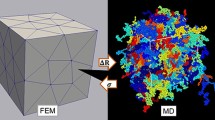Abstract
The computational study of biomolecules has been undermined by the lack of models that accurately represent the structure of big complexes at the atomic level. In this work, we report the development of an algorithm to generate a volumetric mesh of a biomolecule, of any size and shape, based on its atomic structure. Our mesh generation tool leverages the octree algorithm properties with parallel high-performance computing techniques to produce a discretized hexahedral model faster than previous methods. The reported algorithm is memory efficient and generates volumetric meshes suitable to be used directly in Finite Element Analysis. We tested the algorithm by producing mesh models of different biomolecule types and complex size, and also performed numerical simulations for the largest case. The Finite Element results show that our mesh models reproduce experimental data.
Access this chapter
Tax calculation will be finalised at checkout
Purchases are for personal use only
Similar content being viewed by others
References
Gibbons, M.M., Klug, W.S.: Nonlinear finite-element analysis of nanoindentation of viral capsids. Phys. Rev. E 75(3), 031901:1–031901:11 (2007). https://doi.org/10.1103/PhysRevE.75.031901
Anton, A., Wouter, R., Gijs, W., Klaus, S.: Elucidating the mechanism behind irreversible deformation of viral capsids. Biophys. J. 97, 2061–2069 (2009)
Roos, W.H., Bruinsma, R., Wuite, G.J.L.: Physical virology. Nat. Phys. 6, 733 (2010)
George, P.L., Hecht, F., Saltel, É.: Fully automatic mesh generator for 3D domains of any shape. IMPACT Comput. Sci. Eng. 2, 187–218 (1990)
Frey, P.J., George, P.L.: Mesh Generation: Application to Finite Elements, 2nd edn. Hermes Sciences ltd., Hyderabad (2008)
Cheng, S.W., Dey, T.K., Shewchuk, J.R.: Delaunay Mesh Generation. Chapman and HALL/CRC, Cambridge (2013)
Paul, G., Houman, B.: Delaunay Triangulation and Meshing. Application to Finite Elements. Hermes (1998). ISBN 2-86601-692-0
Weatherill, N.P.: Delaunay triangulation in computational fluid dynamics. Comput. Math Appl. 24, 129–150 (1992)
Hardwick, J.C. Implementation and evaluation of an efficient 2D parallel Delaunay triangulation algorithm. In: Proceedings of the 9th Annual Symposium on Parallel Algorithms and Architectures (1997)
Cigoni, P., Montani, C., Perego, R., Scopigno, R.: Parallel 3D delaunay triangulation. Eurographics Association (1993)
Joachim, S.: An advancing front 2D/3D mesh generator based on abstract rules. Comput. Vis. Sci. 1, 41–52 (1997)
Michael, S., Arthur, O., Juan-Claude, S.: Reduced surface: an efficient way to compute molecular surfaces. Biopolymers 38, 305–320 (1996)
Ho-Lun, C., Shi, X.: Quality mesh generation for molecular skin surface using restricted union of balls. J. Comput. Geom. Theory Appl. 42, 196–206 (2009)
Yu, Z., Holst, M.J., Cheng, Y., McCammon, J.A.: Feature preserving adaptive mesh generation for molecular shape modeling and simulation. J. Mol. Graph. Modell. 26, 1370–1380 (2008)
Alonzo-Velázquez, J., Botello Rionda, S., Herrera-Guzmán, R., Carrillo-Tripp, M.: CapsidMesh: atomic-detail structured mesh representation of icosahedral viral capsids and the study of their mechanical properties. Int. J. Numer. Methods Biomed. Eng. 34, e2991 (2018)
Vargas Felix, M., Botello-Rionda, S.: FEMT, open source tools for solving large systems of equations in parallel. Acta universitaria (2012)
OpenMP Architecture Review Board: OpenMP application programing interface OpenMP (2018)
Frisken, S.F., Perry, R. N.: Simple and efficient traversal methods for quadtrees and octrees. Mitsubishi Electric Research Laboratories (2002)
Michel, J.P., et al.: Nanoindentation studies of full and empty viral capsids and the effects of capsid protein mutations on elasticity and strength. Proc. Nat. Acad. Sci. 103, 6184–6189 (2006)
Author information
Authors and Affiliations
Corresponding author
Editor information
Editors and Affiliations
Rights and permissions
Copyright information
© 2019 Springer Nature Switzerland AG
About this paper
Cite this paper
López, J., Botello, S., Herrera, R., Carrillo-Tripp, M. (2019). Parallel High-Performance Computing Algorithm to Generate FEM-Compliant Volumetric Mesh Representations of Biomolecules at Atomic Scale. In: Torres, M., Klapp, J. (eds) Supercomputing. ISUM 2019. Communications in Computer and Information Science, vol 1151. Springer, Cham. https://doi.org/10.1007/978-3-030-38043-4_25
Download citation
DOI: https://doi.org/10.1007/978-3-030-38043-4_25
Published:
Publisher Name: Springer, Cham
Print ISBN: 978-3-030-38042-7
Online ISBN: 978-3-030-38043-4
eBook Packages: Computer ScienceComputer Science (R0)




